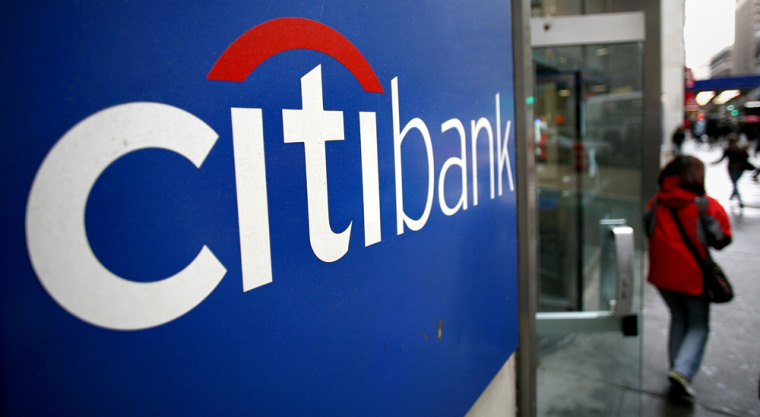The Obama administration is trying to craft a plan that would give the government direct ownership of some banks without scaring away private investors who remain a potential source of badly needed capital.
Call it what you want, but no one wants to call it nationalization.
Worries about possible bank failures have intensified in recent days, prompting a broad and steep selloff in the stock market. In response, the five major federal bank regulators issued an unusual joint statement Monday morning, declaring that “the U.S. government stands firmly behind the banking system during this period of financial strain.”
After months of sliding from one crisis to another, and after a government injection of nearly $350 billion, the nation’s banking system remains fragile. The share prices of the biggest, most troubled banks, including Citigroup and Bank of America, have fallen into the low single digits, helping push broad stock market indexes to their lowest levels since 1997.
Souring loans on the books of many banks will yield more losses that could wipe out the remaining value of those shares, rendering the banks insolvent. Some fear that the biggest banks in the worst shape already have insufficient assets to meet their obligations.
Ever since the financial meltdown began over a year ago, banks have been struggling to shore up their capital base to withstand continued losses from loans gone bad. Initially confined largely to home mortgages, there are rising concerns about possible defaults on other types of debt, including commercial real estate loans, student loans, auto loans and credit card debt.
Late last month, the International Monetary Fund projected that worldwide banking industry losses may reach $2.2 trillion, up from a previous estimate of $1.4 trillion. The report estimated that the capital shortfall needed to cover those losses for U.S. and European banks alone was at least a half-trillion dollars.
"Going forward, banks will need even more capital as expected losses continue to mount," the bank warned.
It’s uncertain how much more capital will be needed. Part of the problem is that it is extremely difficult to value the “troubled” assets on the banking industry’s books. For example, some borrowers who are current on their loans today are at risk of defaulting if the economy continues to deteriorate. But if they do not default, the loan could be worth the full value.
That’s why the Obama administration is undertaking a “stress test” of troubled banks’ financial statements before dispensing the second half of a congressionally approved $700 billion to rescue the industry. The goal is to try to get a better estimate of how much more financial damage may be inflicted by the deteriorating global economy, and in turn, whether the package may need to increase.
In good times, banks turn to the capital market to raise additional cash. But private investors have been spooked by banks’ continuing losses and uncertainty over how much further the global economy will deteriorate.
So far, the capital needed to backstop ailing banks has come largely from the federal government’s financial rescue plan. The government already has injected nearly $250 billion into hundreds of banks in return for preferred shares of stock, which don’t come with voting rights. The hope was that the money would provide banks with a short-term cushion as they raised private capital without having the government take a true ownership stake.
But private investors remain leery of putting up fresh cash, in part because they fear the government will eventually have to resort to buying large chunks of common stock. That would almost certainly wipe out existing shareholders.
The government’s latest plan, called the Capital Assistance Program, involves swapping taxpayer money for a new class of stock that doesn’t represent direct ownership. But if a bank’s financial health deteriorates, the government would be able to convert those shares into common stock with traditional voting rights and the control that goes with them. After going to great lengths to avoid having the government own direct stakes in banks, the new round of investment amounts to what could be called “standby” ownership.
Under the latest plan, the government will monitor a troubled bank’s books and, if it determines the bank needs to raise more capital, it will give the bank a chance to seek private investors. If private money can’t be found, the government will provide capital in exchange for “mandatory convertible preferred shares.” The government could convert those shares to common stock, if needed, to cover future losses. By doing so, it would also increase its direct ownership of the bank.
The plan is expected to be applied first to Citigroup, which already has taken $45 billion of federal bailout funds in exchange for preferred shares, along with another $300 billion in federal guarantees. Published reports Monday said Citi was preparing to give the government common shares in exchange for the preferred shares, giving the government an ownership stake of as much as 40 percent. With that much control, the government would have effectively nationalized the bank.
Citigroup stock rose nearly 10 percent on the news, closing at $2.14 a share.
Nationalization is not unheard of in the United States. When railroads stopped providing intercity passenger service in the late 1960s, the government set up Amtrak to take over those routes. Some countries have state-owned airlines to provide service not available from for-profit carriers. But the Obama administration has said repeatedly it wants to avoid full nationalization at all costs.
“Because our economy functions better when financial institutions are well-managed in the private sector, the strong presumption of the Capital Assistance Program is that banks should remain in private hands," bank regulators said Monday in their joint statement.
But others, including former Federal Reserve Chairman Alan Greenspan, have said that nationalization of the nation's weakest banks may be inevitable.
"It may be necessary to temporarily nationalize some banks in order to facilitate a swift and orderly restructuring," Greenspan told the Financial Times in comments published last week.
